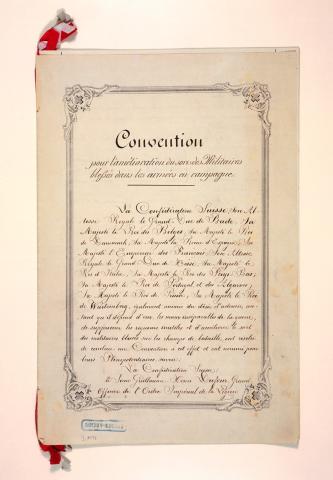International Humanitarian Law and China: Historical Timeline

1904
-
The Qing government joined the 1st Geneva Convention of 1864.
-
On November 21, China ratified the 1899 Hague Convention III for the Adaptation to Maritime Warfare of the Principles of the Geneva Convention of 22 August 1864.
1906
On July 6, China signed the revision of the Geneva Convention of 1906 following its participation in the Diplomatic Review Conference in Geneva.
1907
On June 12, China ratified the 1899 Hague Convention II with Respect to the Laws and Customs of War on Land and its annex.
1909
On November 27, China ratified the 1907 Hague Convention X for the Adaptation to Maritime Warfare of the Principles of the Geneva Convention.
1910
On January 15, China ratified the 1907 Hague Convention III relative to the Opening of Hostilities, Convention V respecting the Rights and Duties of Neutral Powers and Persons in Case of War on Land, Convention IX concerning Bombardment by Naval Forces in Time of War, and Convention XIII concerning the Rights and Duties of Neutral Powers in Naval War.
1917
On May 10, China ratified the 1907 Hague Convention IV respecting the Laws and Customs of War on Land and its annex, Convention VI relating to the Status of Enemy Merchant Ships at the Outbreak of Hostilities, Convention VII relating to the Conversion of Merchant Ships into Warships, Convention VIII relative to the Laying of Automatic Submarine Contact Mines, and Convention XI relative to certain Restrictions with regard to the Exercise of the Right of Capture in Naval War.
1929
-
On July 27, China signed the two Geneva Conventions of 1929 and ratified them on 19 November 1935 after taking part in the Diplomatic Review Conference.
-
On August 24, China ratified the Protocol for the Prohibition of the Use of Asphyxiating, Poisonous or Other Gases, and of Bacteriological Methods of Warfare.
1935
On November 19, China ratified the Geneva Convention for the Amelioration of the Condition of the Wounded and Sick in Armies in the Field and the Geneva Convention relative to the Treatment of Prisoners of War.
1942
From April 1942 to 1950, ICRC continued its activities in China through its Shanghai delegation.
1943
From April 1943 to the end of 1945, as factual elements, the ICRC had a delegation in Chongqing.
1949
On 12 August 1949, the four Geneva Conventions for the protection of victims of war were adopted. These conventions protect wounded and sick soldiers on land (Convention I); wounded, sick and shipwrecked military personnel at sea (Convention II); prisoners of war (Convention III) and civilians (Convention IV).
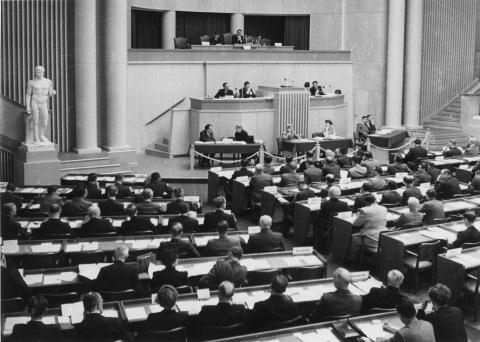
1951
First visit of an ICRC president, Paul Ruegger, to the People’s Republic of China (PRC) at the invitation of the government.
1952
On July 13, the Government of PRC issued a statement declaring its recognition of the Geneva Conventions signed on 12 August 1949 by the Government of the Republic of China.
1956
On November 5, at the 50th meeting of the Standing Committee of the National People’s Congress (NPC) of PRC, it was decided to ratify the Geneva Convention for the Amelioration of the Condition of the Wounded and Sick in Armed Forces in Field of August 12, 1949.
1981
On September 14, China ratified the Convention on Prohibitions or Restrictions on the Use of Certain Conventional Weapons Which May Be Deemed to Be Excessively Injurious or to Have Indiscriminate Effects (the 1980 CCW).
1983
-
On April 18, China ratified the Convention on the Prevention and Punishment of the Crime of Genocide.
-
On September 14, China ratified the Additional Protocol I and Additional Protocol II to the Geneva Conventions.
1984
On November 15, China ratified the Convention on the Prohibition of the Development, Production and Stockpiling of Bacteriological (Biological) and Toxin Weapons and on their Destruction.
1991
On December 29, China ratified the Convention on the Rights of the Child.
1997
On April 25, China ratified the Convention on the Prohibition of the Development, Production, Stockpiling and Use of Chemical Weapons and on their Destruction.
2000
On January 5, China ratified the Convention for the Protection of Cultural Property in the Event of Armed Conflict (the 1954 Hague Convention) and its First Protocol.
2004
ICRC and PLA co-organized a seminar on the Law of Armed Conflict in Xi’an for some 40 military officers from 19 Asia Pacific countries to raise awareness among military personnel about the importance of IHL in today’s strategic environment.
2005
On July 20, ICRC signed Headquarter Agreement with the Ministry of Foreign Affairs (MFA) of China, and ICRC’s Regional Delegation for East Asia was moved to Beijing from Bangkok.
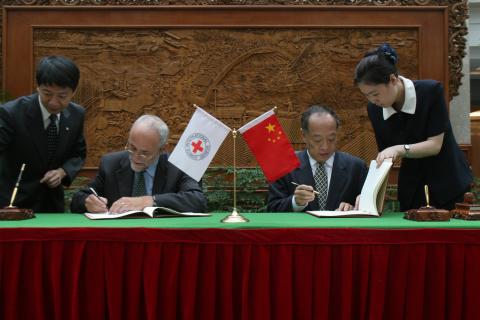
2007
-
China set up the National Committee on International Humanitarian Law (NCIHL) to promote the dissemination and implementation of IHL, enhance international cooperation, and conduct research in specific areas of IHL. The Red Cross Society of China (RCSC) serves as the leadership and secretariat of the NCIHL, with representatives from MFA, Ministry of Defence, Ministry of Justice, Ministry of Education, Administration of Cultural Heritage, Legislative Affairs Commission of NPC, and RCSC.
-
ICRC Chinese website was officially launched as the major resource of Chinese-language materials on IHL. In 2024, a new website is launched with better functionality and user experience to further improve the online access of IHL resources.
-
After co-organizing the IHL Moot Court Competition with the Hong Kong Red Cross since 2003, the 1st annual Red Cross IHL Moot Court Competition (China Round) was organized in Beijing, China. Since 2007, a total of 2,780 students have participated in 17 IHL moot competitions with the participation of 47 universities on average every year.
-
ICRC and MFA co-organized a symposium on IHL to commemorate the 30th anniversary of the adoption of the two Additional Protocols to the Geneva Conventions.
-
The Chinese edition of Customary International Humanitarian Law, Volume I: Rules, was officially published. It analyzes the customary rules of IHL and contains a detailed summary of the relevant treaty laws and state practices worldwide. In the absence of ratifications of important treaties in this area, this is a publication of major importance, identifying the common core of IHL binding on all parties to all armed conflict.
-
On December 29, China ratified the Optional Protocol to the Convention on the Rights of the Child on the Involvement of Children in Armed Conflict.
2009
On August 12, the ICRC and NCIHL of China co-organized a seminar to commemorate the 60th anniversary of the adoption of the Geneva Conventions, providing an opportunity for academic discussions on specific aspects of IHL, its development and domestic implementation.
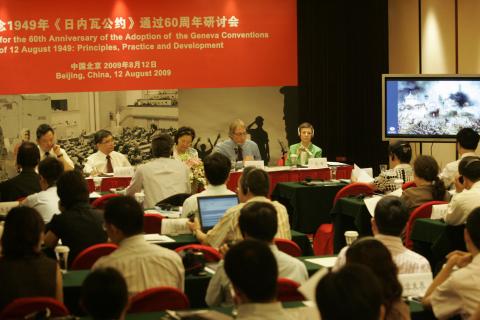
2010
China ratified the Protocol on Explosive Remnants of War (Protocol V to the 1980 CCW).
2011
The 1st IHL Summer Session was successfully launched at Peking University. Since 2011, 470 individuals have participated in 12 IHL Summer Sessions. This unique platform enabled academics and policymakers to exchange ideas, deepen understanding of humanitarian challenges and humanitarian action, and promote the development of IHL research and education in China.
2014
From September 22 to 27, the 8th Senior Workshop on International Rules governing Military Operations was held in Xi’an, China.
Co-organized with PLA of PRC, the seminar was attended by more than 80 senior military officers and delegates of ICRC from 58 countries. Participants were able to share experiences, achievements and best practices in a truly international setting, broadening their knowledge of the application of these laws in specific operations.
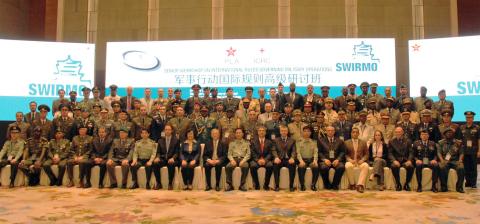
2015
On September 24 and 25, the ICRC and the China Arms Control and Disarmament Association co-organized the roundtable regarding IHL and weapons.
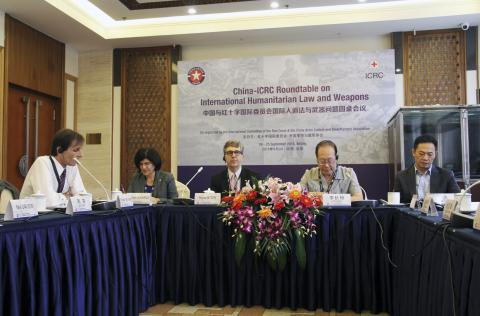
2016
The first “Star of Humanity” IHL Online Competition was launched, which further strengthens the interest and understanding of the Chinese public in IHL and the knowledge of the International Red Cross and Red Crescent Movement. As of the year 2024, the IHL Online Competition has been held for 9 editions.
2017
On May 19, the ICRC and the Institute of International Law of the Chinese Academy of Social Sciences co-organized a seminar to commemorate the 40th anniversary of the adoption of the 1977 Additional Protocols to the Geneva Conventions. The seminar analysed key issues covered by IHL, the main achievements of the two Additional Protocols, and the challenges emerged.
2018
On May 8, the 5th Asia-Pacific Regional Workshop on the Law of Armed Conflict at Sea, co-organized by ICRC and the National Defence University of the Chinese PLA, was held in Shanghai for the first time in China. The four-day workshop brought together 35 senior military officers from 19 countries in the Asia-Pacific region to discuss topics related to armed conflict at sea and humanitarian action at sea.
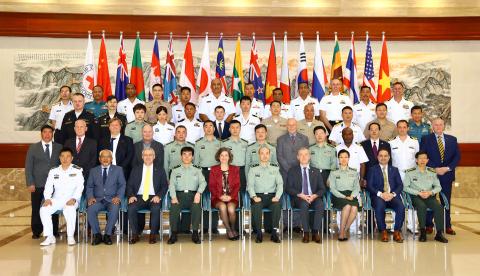
2019
On 7 September 2019, a seminar organized by ICRC and the Chinese Society of International Law to commemorate the 70th anniversary of the adoption of the Geneva Conventions was held in Beijing, which aimed at reviewing and introducing challenges and new developments in IHL and providing a platform for promoting international academic exchanges in IHL.
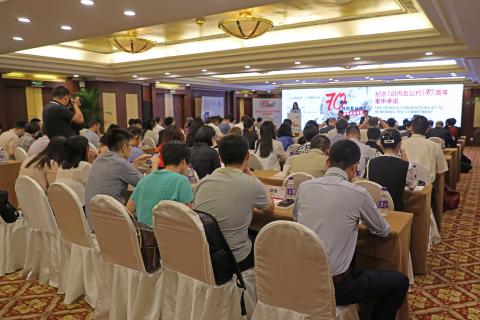
2020
China joined the Arms Trade Treaty (ATT), which is a significant step of its active participation in the global governance on arms trade as well as maintaining international and regional peace and stability.
2021
On June 19, the ICRC and the China University of Political Science and Law co-organized an international symposium on “IHL in Complex Times: Old and New Frontiers”. With both online and offline sessions, more than 60 scholars and practitioners from universities, military and government, ICRC experts and law students shared their views on key topics in IHL in the current context.
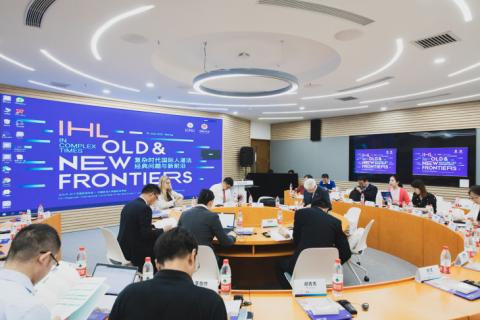
2022
The Chinese version of the updated Commentary on the First Geneva Convention was published in September. This article-by-article Commentary, reflecting developments in law and practice over the past seven decades, provides a valuable tool for practitioners and academics alike.
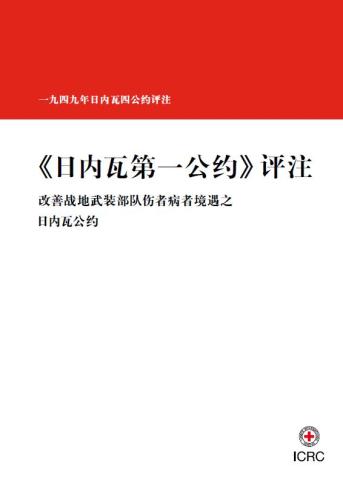
2023
On June 10, the Chinese version of the updated Commentary on the Second Geneva Convention was launched at the seminar on the theme “Contemporary Development of the Law of Armed Conflict at Sea: From 1949 to 2023” in Shanghai.
2024
On May 25, the ICRC co-organized a seminar on “75 Years of the Four 1949 Geneva Conventions: International Humanitarian Law and Peace” with Jilin University in commemorating the 75th anniversary of the 1949 four Geneva Conventions and the 70th anniversary of the 1954 Hague Convention.

